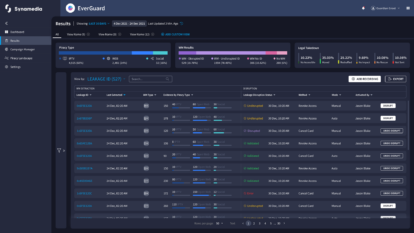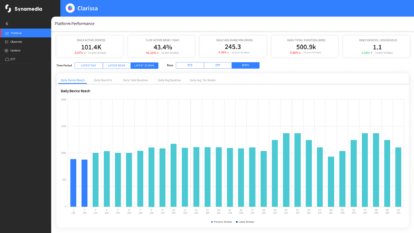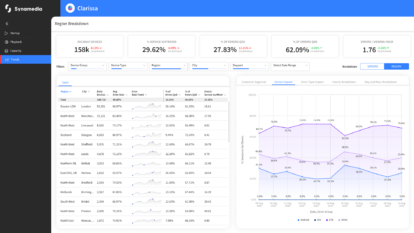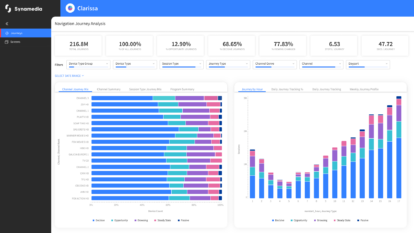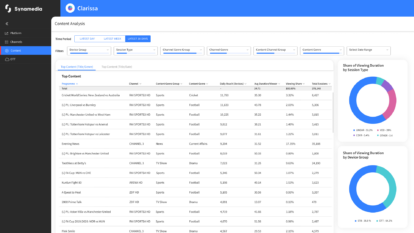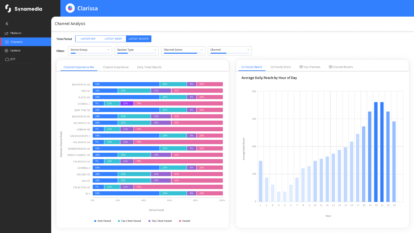In the ever-evolving landscape of sports entertainment, Synamedia is reshaping the fan experience with its groundbreaking In-Stadium Experience. This immersive solution, designed for fans at home, in the stadium, or on the move, ushers in a new era of sports viewing, seamlessly integrating technology and passion for the ultimate spectator experience.
Ultra-low latency and breakthrough technologies
At the core of this revolution is Synamedia’s state-of-the-art video network technologies including video compression, processing, streaming, and edge CDN delivery. This powerful combination ensures an ultra-low end-to-end latency, a crucial factor in providing fans with real-time, uninterrupted access to the sporting events they love. With a latency of under one second, the technology guarantees a lag-free immersive experience.
Security is a top priority, especially in the world of high-value sports rights. Synamedia’s solution offers robust support for Digital Rights Management (DRM) ensuring that the content remains secure and accessible only to the intended audience.
Enhanced user experience
The In-Stadium Experience leverages both on-prem hardware and cloud technology for data processing and streaming. Optimised LL-HLS, combined with ultra-low latency compression, delivers an end-to-end video experience that sets new industry standards. Each stream is meticulously recorded for instant replay and added to the VOD catalogue for rewatching. A flexible CDN ensures scalability to meet the fluctuating demands of a diverse and engaged fan base.
Synamedia teamed up with NativeWaves to take the user experience to new heights by allowing fans to choose between different camera feeds, see games statistics, replay the action, and more. All these features, coupled with commentary and subtitles, provide a personalised and dynamic viewing experience like never before. Whether focusing on a crucial golf hole or capturing the reaction of team members and coaches on the bench, fans now have unprecedented control over their sports-watching adventure.
Synamedia’s flexible video processing portfolio not only supports delivery to companion devices, but further enhances the experience by creating high-quality streams tailored for the large TVs in stadium hospitality areas, ensuring that the impact of the event is not compromised.
Incorporating NativeWaves’ real-time data rendering, the In-Stadium Experience offers viewers in-depth statistics about the team and the progress of the event. This collaboration with NativeWaves unlocks the power of metadata, providing fans with a comprehensive understanding of every facet of the game.
A real-life pilot to prove the potential
In a pioneering move, La Liga’s Real Betis Balompié football club, in partnership with Cellnex, has embraced the In-Stadium Experience. Real-time audio description and edge streaming video from eight cameras complement the match experience, allowing fans to rewind and relive every significant moment from multiple angles. All video processing, encoding, and transmission runs on edge servers within the stadium, minimising costs and reducing latency by avoiding the internet.
Cellnex’s Distributed Antenna System (DAS) at the Benito Villamarín Stadium ensures optimal coverage for the In-Stadium Experience, even in a venue with a capacity of 60,000 spectators.
A commitment to innovation in sports entertainment
Synamedia’s In-Stadium Experience, in collaboration with NativeWaves, not only delivers on the promise of an augmented, compelling fan experience but also marks a significant leap forward in the realm of sports entertainment. The integration of Synamedia’s compression, processing, streaming and edge CDN delivery is a testament to Synamedia’s commitment to innovation, elevating the joy of sports viewing to new heights. As fans continue to demand more immersive and interactive experiences, Synamedia stands at the forefront, pioneering the future of sports entertainment.
About the Author
Tim has responsibility for Synamedia’s video compression and broadcast video processing with its virtual Digital Content Manager (vDCM) solution. He also leads the In-Stadium Experience product which gives fans an immersive sport experience in the stadium, on 5G and in the home.
Tim has an extensive background in engineering and product management. Prior to joining Synamedia in 2008, Tim was business development manager at IoT software company Waylay NV following 12 years at Cisco as business development manager for video solutions. He also held engineering and product management roles at Scientific Atlanta (acquired by Cisco), Barco, and Siemens, among others.

